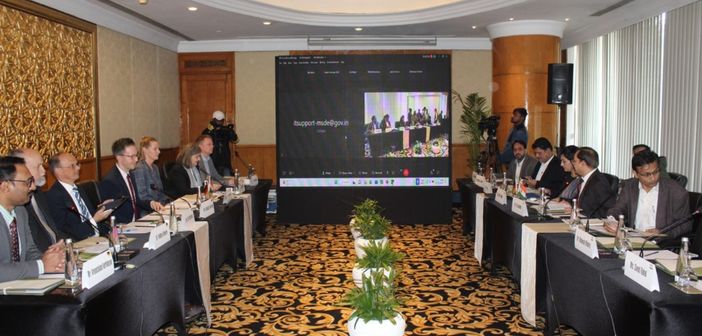The 12th meeting of the Indo-German joint working group was organized on December 7, 2022, in New Delhi to boost Vocational Education and Training (VET). The purpose of this meeting was to promote economic growth by equipping youth with the required skills and giving them access to relevant opportunities (VET).
The meeting’s discussions focused on institutionalising a uniform VET process to meet skill requirements in priority sectors according to German standards. A skill mapping exercise will be carried out to analyse skill gaps, and bridge courses and upskilling programs will be designed to teach Indian workers.
The meeting was co-chaired by Dr. KK Dwivedi, Joint Secretary, Ministry of Skill Development and Entrepreneurship, Government of India, and Mr. Alexander Hochradel, Senior Policy Officer of Division 222: ERASMUS; International Cooperation in Vocational Training, Federal Ministry of Education and Research (BMBF).
The two partner countries addressed creating a framework for employer connections and learning how trained and certified workers may contribute to economic development during the discussion. Mutual accreditation of training providers in both countries will also be undertaken through G2G, G2B, and B2B collaborations with relevant institutions that have worldwide standards for training, evaluation, and certification.
The Federal Ministry of Education and Research (BMBF) and the Federal Ministry of Economic Cooperation and Development (BMZ) discussed the aggregation of demand requirements and employer mandates to NSDCI, including job descriptions, eligibility criteria, foreign language training, and curriculum details. BMBF and BMZ may also give technical assistance for Training of Trainers (ToT), Trainers of Assessors (ToA), foreign language training, and the development of industry-relevant content and curriculum.
Shri Dr. KK Dwivedi, Joint Secretary, Ministry of Skill Development and Entrepreneurship, Government of India, stated, “Because of the strength of our bilateral relations, Germany is one of India’s most significant partners in Europe. And the discussions held at this meeting will further strengthen the relationship between the two countries and ensure that we propel the economy by providing the necessary support and talent through vocational education and training. There is great potential for workforce mobility from India to Germany. The fact that almost one-third of Germany’s Blue Card recipients in 2021 will hail from India is a testimony to the vast complementarities that exist between the requirements for skills and talents in Germany and the vast reservoir of young, educated, and skilled people in India, who can contribute positively to India´s multi-dimensional cooperation with Germany.”

He further added, “Apprenticeship being one of the most sustainable models of skill development, India offers virtual and physical exchange programs in academic and vocational domains focused on apprenticeship training where students will be able to earn while working on on-the-job projects in both countries.”
To know more about the German Dual VET system and initiatives from German Office for International Cooperation in Vocational Education and Training (GOVET), please visit – https://nationalskillsnetwork.in/govet-germany/
Alexander Hochradel, Senior Policy Officer of Division 222: ERASMUS; International Cooperation in Vocational Training, Federal Ministry of Education and Research (BMBF), said, “India has the added advantage of having a large pool of young talent that can fill the demand for skilled workforce in our country for a variety of trades. Undoubtedly, VET has taken on a crucial role in today’s dynamic ecosystem, which has undergone significant changes since the pandemic. Skilled labour is the only way to meet these changes in today’s world of work. Under the current system of the recently announced German Immigration Act, recognition of the equivalence of professional qualifications is crucial for bringing in synergies between the two countries. It is also envisioned to conduct a mapping exercise of skill gaps in key sectors in Germany, based on which an action plan for bridging courses for skill training of the Indian workforce for mobility to Germany can be developed.”
Previously, India and Germany partnered on projects such as Indo-German Vocational Education Training, SINADE, IGnITE (Indo-German Initiative for Technical Education), QualIndia, and iMOVE to increase Indians’ overseas mobility. As a result, progress toward a standard mechanism for skill gap mapping and a global skill harmonisation framework is critical to improving migrants’ wages and remittance transfers.
A complementary project on strengthening bottom-up corporate models of dual VET in industrial clusters in Northern India has been funded by the BMBF. The project’s goal is to create a business model for dual vocational training that can later be used in other clusters.
A recent study by the NSDCI analysed the workforce demand in 16 destination countries (2022–2027).
Also read: Dharmendra Pradhan meets with counterparts for a series of bilateral meetings to further their cooperation in the areas of education and skilling https://nationalskillsnetwork.in/dharmendra-pradhan-meets-with-counterparts-for-a-series-of-bilateral-meetings-to-further-their-cooperation-in-the-areas-of-education-and-skilling/
In the future, Germany’s greatest difficulty is likely to be finding enough trained workers, which emphasises the importance of global skill mapping to take advantage of new trends in many industries. Manufacturing, healthcare, wholesale and retail, information technology and research technology, and construction will all have a high demand for a skilled workforce.













